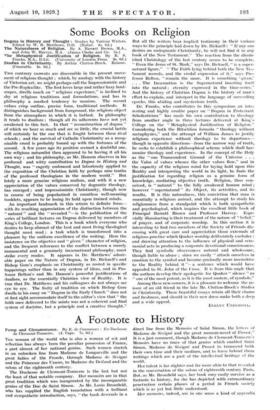A Footnote to History
Tim woman of the world who is also a woman of wit and reflection has always been the peculiar possession of France, a part almost of her national genius. Such women stretch in an unbroken line from Madame de Longueville and the great ladies of the Fronde, through Madame de Sevigne and the Princesse des Ursens, to Madame du Deffand and the salons of the eighteenth century.
The Duchesse de Clermont-Tonnerre is the last but not the least of that notable company. Her memoirs are in that great tradition which was inaugurated by the incomparable genius of the Due de Saint Simon. As Mr. Louis Bromfield, who has supplied the English translation with a brilliant and sympathetic introduction, says, the book descends in a direct line from the Memoirs of Saint Simon, the letters of Madame de Sevigne and the great memoir-novel of Proust." It is a just comment, though Madame de Clermont-Tonnerre's Memoirs have no trace of that genius which enabled Saint Simon, Madame de Sevigne and Proust to transcend both their own time and their medium, and to leave behind them writings which are a part of the intellectual heritage of the world.
Her talent is far slighter and far more akin to that revealed in the conversation of the salons of eighteenth century Paris. But, as Mr. Bromfield says, her book may easily survive as a footnote to history, for she has depicted with extraordinary penetration certain phases of a period in French society which is as yet but little understood.
Her memoirs, indeed, are in one sense a kind of appendix
to Proust. She knew Proust well, and she deals entirely with that world which he chose- to portray and of which he
has left so supreme a picture. Like Saint Simon—and unlike Proust—Madame de Clermont-Tonnerre herself belonged to the inner circles of the French aristocracy. The daughter of a Due de Grammont, and the granddaughter of that Due tie Granunont who was Napoleon M.'s Foreign Secretary, and whom Bismarck duped with the Ems telegram, she married the Due de Clermont-Tonnerre, and her early life was passed entirely in the shadow of the Faubourg Saint Germain. Like Saint Simon, too, she has painted the picture of a world that was declining. He has given us a series of magnificent tableaux, the picture of that prolonged and brilliant sunset of the society of the ancient regime which was the end of the reign of Louis XIV. Some two centuries later, Madame de Clermont-Tonnerre gives us the description of the twilight of the old nobility in the Paris of the Third Republic. Unlike Saint Simon, she is not a passionate partisan of the ancient regime. In her memoirs she avows that her political principles are Republican. Her view of the world in which she was born has often a bitter insight worthy of Proust himself—and indeed that world never had the glamour for her which it always kept for Proust, even when he had penetrated all its secrets.
Even in her early youth she had no illusions about the position of Faubourg Saint Germain in modern France. She was entirely unwilling to stay within that isolated citadel
where the one great reality was the past. So she went to the salon of Madame Arman de Caillavet, the Egeria of Anatole France, and from that vantage point she made her final commentary upon her own world :— " The attitude of Madame de Caillavet's friends threw light for me on the ingredients composing the society from which I myself came. That society asked for nothing because it had nothing to give, possessing no personal influence in the country, since it no longer took part in its government. But still it had the prestige of its past, elegance, sport, and the art of enjoyment. For it enjoyment is almost a rite. This group is made up of big families and subsists by playing for rich alliances. Since it is divorced from the living energies of the nation this society pro- pagates not vertically but horizontally, attracting its equivalents in the other European countries and the two Americas. It has one code and fifty languages and swells and spreads like a crust round the other social classes."
This commentary is representative of the whole spirit of Madame de Clermont-Tonnerre's memoirs ; she is cynical, lucid, light-hearted-----and entirely disabused.
English readers will naturally turn with interest to her chapters on London. They are shrewd and informative, though she is severe in her comparison of pre-War to post-War London :—
" London has now fallen to the level of a large industrial, commercial and financial town, of which any number keep springing up all over the world. But in those days it was a kind of Nordic Byzantium, with refinements of luxury and unostentatious wealth.
A race of gods and goddesses had descended from Olympus on to England and showed itself in London during June and July.
A gentle, rarefied air enveloped 'the season.'
A drab crowd took its pride in contemplating the rapid, never- ending. rhythmical routine of the pleasures taken, like a noble ritual, by a well dressed elite, of which the theatres, the clubs and the railway-stations were full to overflowing."

































 Previous page
Previous page